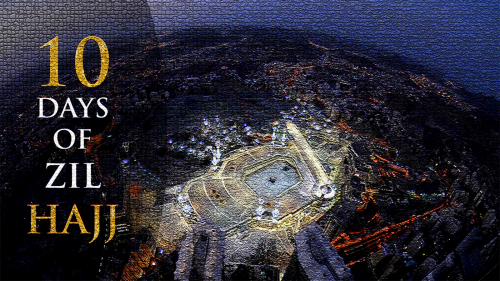Fear, Hope and Jerusalem?

Three years ago, tens of millions of people were experiencing fear or anxiety about the impending end of the world according to a worldwide poll for Reuters (May 2, 2012) that found "nearly 15 percent of people worldwide believe the world will end during their lifetime". "Whether they think it will come to an end through the hands of God, or a natural disaster or a political event, whatever the reason, one in seven thinks the end of the world is coming," said Keren Gottfried, research manager at Ipsos Global Public Affairs which conducted the poll for Reuters.
In the Near East the "Arab Spring" that filled 2011 with great hopes now is viewed with increasing anxiety and fear. Why are so many people this negative and pessimistic about the future of humanity?
While it is true that human society changed more rapidly, violently and fundamentally in the last 150 years than ever before in history, humanity has survived several major revolutions and world wars. Doctors today save the lives of millions; while dictators sacrifice the lives of millions. Populations are exploding in Africa and populations are declining in Europe. Technology produces both worldwide prosperity and worldwide pollution at the same time.
Should we look upon the 21st century with optimistic hope or with fatalistic trepidation? Is the world and our society heading towards a wonder-filled new age, or toward a doomsday? Or are both occurring almost concurrently because breakdown is always a prelude to breakthrough?
The long tradition of trying to foresee the distant, eventual goal of human history started with the Prophets of Israel over 2.700 years ago. The Biblical vision of a Messianic Age may provide us with guidance in understanding the social, economic, scientific and cultural upheavals that will sweep society as it approaches the next stage.
Often, it is the dramatic dangers of the pre-Messianic tribulation that are emphasized in Christian, Islamic and Jewish post scriptural traditions. I will focus on the positive signs developing throughout the world that accord with the Messianic vision of the Biblical Prophets.
In most religious traditions, redemption is defined in terms of individual enlightenment or personal salvation. However, the Prophets of Israel conceived of redemption as a transformation of human society that would occur through the catalyst of a transformation of the Jewish people. This transformation, which will take place in this world at some future time, is called the Messianic Age.
The transition to the Messianic Age is called the birth pangs of the Messiah. The birth of a redeemed Messianic world may be the result of an easy or difficult labor. If everyone would simply live according to the moral teachings of his or her religion, that would itself bring about the Messianic Age. But, if we will not do it voluntarily, it will come through social and political upheavals, worldwide conflicts and generation gaps.
Prophets are sent to every nation to issue a warning that their behavior has consequences, and these consequences must be faced on Judgement Day. As the Qur'an states, "Accountability for mankind is getting closer and closer, yet they are heedless and turn away." (Al-Anbiya 1 and Al-Qamar 1-8) God of course, is always ready to help us defeat evil, if we are ready to work for the establishment of a just and peaceful local and world society; that is why a Messiah will come.
A Messiah is an agent of God who helps bring about this transformation. This agent of God (with several forerunners and many disciples) will be a human being with great leadership qualities; similar to Moses or Muhammed. The arrival of the Messianic Age is what's really important, not the personality of the agents who bring it about, since they are simply the instruments of God, who ultimately is the real Redeemer.
The Messianic Age is usually seen as the solution to all of humanity's basic problems. This may be true in the long run, but the vast changes the transition to the Messianic Age entails, will provide challenges to society for many generations to come. For example, the Prophet Isaiah, 2,700 years ago, predicted that someday there would be a radically new world in which Jerusalem would be filled with joy for "no more shall there be in it an infant that lives only a few days." (65:20)
A century ago, the infant mortality rate in Jerusalem (as in most of the world) was 25-30%. Now it is less than 1%. For thousands of years almost every family in the world suffered the loss of at least one or two infants; now it happens to less than one out of a hundred.
If this radical improvement had occurred over a few years, it would have greatly impressed people. But since it occurred gradually over several generations, people take it for granted. Also, it seems to be part of human nature that most people focus on complaining about the less than 1% that still die (an individual family tragedy heightened by the fact that it is unexpected because it is so rare) rather than be grateful that the infant mortality rate has been reduced by over 96%.
People are quick to point out that as a result of the great reduction in the infant mortality rate, the world's population has expanded tremendously, which is, and will continue causing major social and economic problems in non-Western societies. Also the great increase in the number of people who live long enough to become "elders" provides us with a new set of challenges (a 5-10 year increase in life expectancy is bad news for pension plans and good news for health care workers). These improvements in human health are unprecedented in human history.
Truly we are close to Isaiah's prophecy, "One who dies at 100 years shall be reckoned a youth, and one who fails to reach 100 shall be reckoned accursed." (65:20). Such radical change will necessitate major changes in the way we think and act when faced with decisions about life and death. Yet who among us would want to return to the high mortality rates and early deaths of previous centuries?
The fulfillment of Isaiah's prophecy has thus gone un-noticed and uncelebrated. But even when the events are rapid and dramatic, people rarely connect them to their Messianic significance for very long. The amazing 1991 covert rescue of 14,325 Ethiopian Jews in an airlift lasting less than 48 hours stirred and inspired people for a few weeks.
Subsequently, the difficult problems the newcomers faced (similar to those of the 900,000 recent Soviet immigrants) occupied the Jewish media. Now both have long been taken for granted. The miracle has become routine. But if you had told the Jews of Ethiopia two generations ago that they would someday all fly to Israel in a giant silver bird, they could only conceive of this as a Messianic miracle.
If you had told Soviet Jews a generation ago that the Communist regime would collapse, the Soviet Empire disintegrate, and hundreds of thousands of Soviet Jews would emigrate to Israel, they would have conceived it only as a Messianic dream. In our own generation therefore we have seen the dramatic fulfillment of Isaiah's prophecy: "I will bring your offspring from the (Middle) East and gather you from the (European) West. To the North (Russia) I will say 'give them up' and to the South (Ethiopia) 'do not hold them'. Bring my sons from far away, my daughters from the end of the earth." (43:5-6)
Isn't it amazing how people adjust to living in a radically new world and forget the past. Indeed, the Prophet Isaiah himself said, "Behold, I create a new Heaven and a new Earth, and former things shall not be remembered." (65:17)
Where does the Messiah fit in with all of this? He will still have lots to do when he arrives. Most Orthodox Jews would not commit themselves to any individual as a Messiah unless he successfully rebuilds the ancient Temple in Jerusalem, fulfilling the prophecy of Zachariah, "He shall build the Temple of the Lord, and he shall bear the glory, he shall sit on the throne and rule, there shall be a priest before the throne, and peaceful counsel will exist between both of them." (6:13)
Now that a large part of the Jewish people have returned to the Land of Israel, and resurrected a Jewish State, one might think that rebuilding a temple of the site where Solomon originally built one almost 3,000 years ago, would be relatively simple, except for the fact that a Muslim Shrine called The Dome of the Rock presently occupies the site, which is not far from the Al-Aksa Mosque.
Often erroneously called the Mosque of Omar, it is not a mosque and it was not built by Omar. It was built in 691 by Abd-Al-Malik. The Al-Aksa Mosque adjacent to it is regarded by Muslims as the third holiest site in the world. Any attempt to replace even the Dome of the Rock would provoke a Muslim Holy War of cataclysmic proportions.
Even though some Orthodox Rabbis believe that someday in the near future, the Holy Temple first built by Prophet Solomon the son of Prophet David, will be rebuilt on its original foundation; most Orthodox Rabbis, and all Conservative and Reform Rabbis, do not believe this because they believe that a rebuilt Temple of Solomon will only be rebuilt after the beginning of the long anticipated Messianic Days of international peace and justice have been realized.
As Prophet Isaiah predicts (19:23-25): "On that (Messianic) day there will be a highway from Egypt to Assyria. The Assyrians will go to Egypt and the Egyptians to Assyria. The Egyptians and Assyrians will worship together. On that day Israel will be the third, along with Egypt and Assyria, a blessing on the earth. The Lord Almighty will bless them, saying, "Blessed be Egypt my people, Assyria my handiwork, and Israel my inheritance." Thus peace throughout the Near East and the whole world precedes the rebuilding of the Temple.
There is, however, a lot of vacant land on the Temple Mount, and a Jewish house of worship could be built adjacent to the Dome of the Rock and the Al-Aksa Mosque, provided that Muslims would agree to cooperate. Most observers agree that anyone who could arrange such Jewish-Muslim cooperation would really be the Messianic Ruler of Peace (Isaiah 9:5).
Christian support for such a cooperative venture would also be important, and anyone who can bring Jews, Christians and Muslims together in mutual respect and cooperation would surely fulfill the greatest of all Messianic predictions, "They shall beat their swords into plowshares and their spears into pruning knives; nation shall not take up sword against nation, they shall never again teach war." (Isaiah 2:4) Indeed, Jewish/Christian/Muslim agreements establishing world wide peace would not be possible without great spiritual leadership in all three communities.
Thus, each community could consider its leadership to be Messianic, and this would fulfill the culminating verses of Isaiah's Messianic prophecy as enlarged upon by Micah (4:3-5): "They shall beat their swords into plowshares and their spears into pruning knives. Nation shall not take up against nation, they shall never again teach war, but every man shall sit under his grapevine or fig tree with no one to disturb him, for it is the Lord of Hosts who spoke. Though all peoples walk, each in the name of its God, we will walk in the name of the Lord our God for ever and ever."
If each people truly follows the best of its own religious teachings; the Messianic Age of world wide peace will surely have arrived, and then-and only then-will the Temple of Solomon be rebuilt, and God's Holy Kingdom established.

















